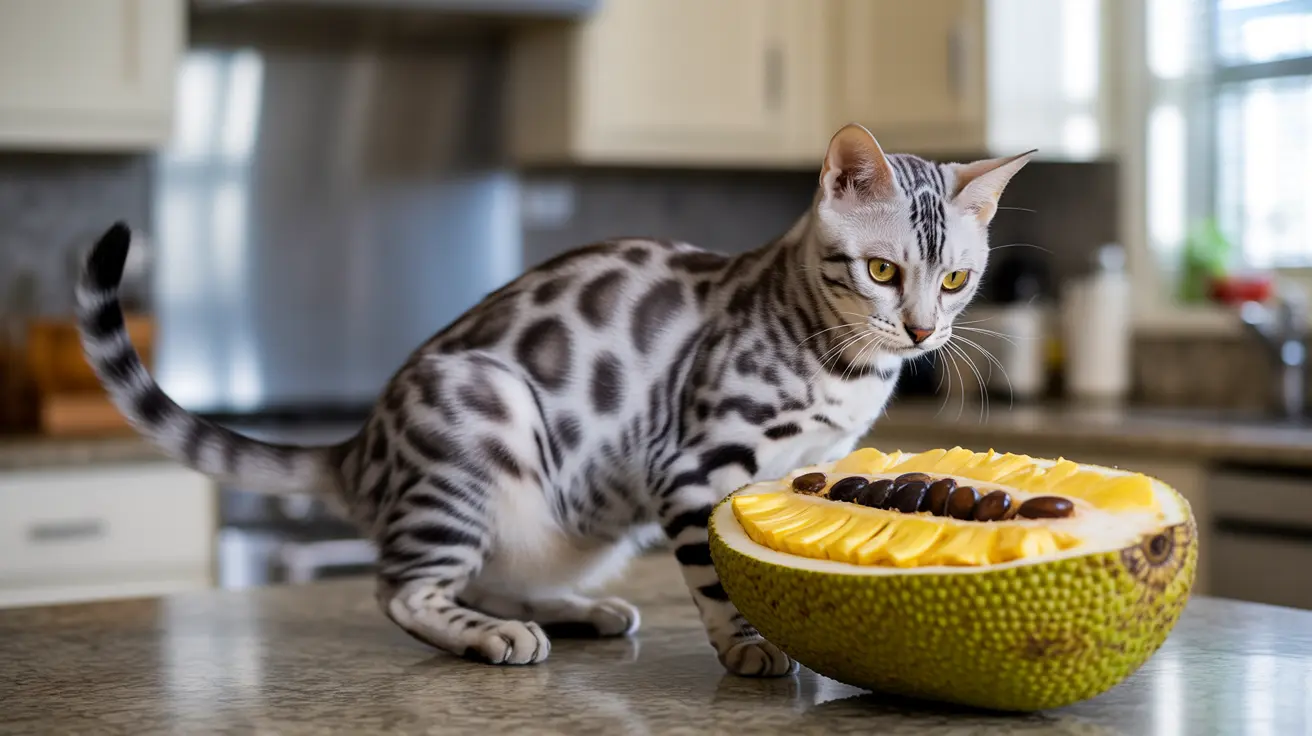As exotic fruits become more popular in Western diets, pet owners often wonder about sharing these novel foods with their feline companions. Jackfruit, a massive tropical fruit related to figs, has gained particular attention. However, veterinary experts strongly advise against feeding jackfruit to cats, despite its not being officially listed as toxic.
In this comprehensive guide, we'll explore why jackfruit isn't suitable for cats, examine potential risks, and discuss what to do if your cat accidentally consumes this tropical fruit.
Understanding Jackfruit and Its Relationship to Cats
Jackfruit is a large tropical fruit belonging to the Moraceae (fig) family, with whole fruits weighing between 40 and 120 pounds. While humans enjoy its sweet flavor and nutritional benefits, cats' digestive systems and nutritional needs are fundamentally different from ours.
As obligate carnivores, cats lack the necessary enzymes to properly digest plant materials and don't have taste receptors for sweetness. This biological reality makes jackfruit not only unnecessary but potentially problematic for feline consumption.
Why Veterinarians Advise Against Feeding Jackfruit to Cats
Fig Family Concerns
While jackfruit isn't listed as toxic on major veterinary poison databases, its relationship to figs raises significant concerns. Figs contain proteolytic enzymes and psoralens that can be harmful to cats, potentially causing cellular damage and digestive issues.
Physical and Digestive Risks
Several aspects of jackfruit make it particularly risky for cats:
- Large seeds that pose choking and obstruction hazards
- High sugar content that can lead to digestive upset and contribute to obesity
- Excessive fiber that may cause gastrointestinal disturbance
- Potential presence of harmful additives in prepared or canned varieties
Signs of Jackfruit-Related Problems in Cats
If your cat consumes jackfruit, watch for these symptoms:
- Vomiting or diarrhea
- Excessive drooling
- Lethargy or unusual behavior
- Signs of abdominal discomfort
- Difficulty breathing (if seeds are involved)
What to Do If Your Cat Eats Jackfruit
Take these immediate steps if your cat consumes jackfruit:
- Remove any remaining fruit from your cat's reach
- Check for signs of seed consumption
- Monitor your cat closely for symptoms
- Contact your veterinarian for guidance, especially if symptoms develop
- Keep packaging or fruit samples if needed for identification
Safe Dietary Alternatives for Cats
Instead of experimenting with fruits like jackfruit, focus on providing your cat with:
- High-quality, AAFCO-approved cat food
- Veterinarian-recommended treats
- Fresh, clean water always available
- Occasional vet-approved treats (limited to 10% of daily calories)
Frequently Asked Questions
Is jackfruit safe for cats to eat or is it toxic?
While jackfruit isn't officially listed as toxic, veterinarians strongly advise against feeding it to cats due to potential risks associated with the fig family and digestive concerns.
What are the risks if my cat accidentally eats jackfruit or its seeds?
The main risks include choking hazards from seeds, digestive upset from high sugar and fiber content, and potential reactions to compounds similar to those found in figs.
Can eating jackfruit cause vomiting or diarrhea in cats?
Yes, cats may experience vomiting or diarrhea after consuming jackfruit due to its high sugar content and their limited ability to digest plant materials.
Why should cats avoid eating jackfruit despite it not being listed as toxic?
Cats should avoid jackfruit because they're obligate carnivores who can't properly digest fruit sugars and fiber, plus there are concerns about its relationship to potentially toxic fig family compounds.
What should I do if my cat consumes jackfruit and shows signs of illness?
Contact your veterinarian immediately if your cat shows any symptoms after eating jackfruit, such as vomiting, diarrhea, lethargy, or excessive drooling.
While it might be tempting to share exotic fruits with your feline friend, it's best to stick to veterinarian-approved foods and treats. If you're ever uncertain about a food's safety for your cat, consult with your veterinarian before offering it.






